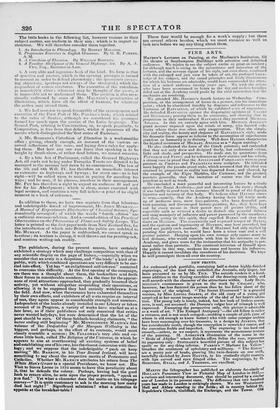The publishers, during the present season, hare certainly exhibited a
strategy which may challenge competition with that of any scientific display on the page of history,—especially when we consider that an army is a despotism, and " the trade" a kind of re- public, with which combined operations are very difficult to be car- ried into effect. Yet has " an enlightened self-interest" contrived to overcome this difficulty. At the first opening of the campaign, ere there was a thought about them, the booksellers sent forth their forces in considerable numbers. As the time for the appear- ance of rival attractions approached, they gradually lessened their activity, yet without altogether suspending their operations, or allowing it to be supposed they had entirely withdrawn from the field. And now, when the enemies have exhausted themselves by their own efforts, and exhibiters of all sorts require an interval of rest, they again appear in considerable strength and numbers. Independent of the books already installed in our Library or taken account of in Progress, a variety of works have reached us at a late hour, as if their publishers not only conceived that critics never wanted holy-days, but were determined that the lot of the poet should be ours. Of these Sabbath-breaking claimants, " the never ending still beginning" Mr. MONTGOMERY MARTIN'S first volume of the Despatches of the Marquis Wellesley is the biggest, and perhaps, in the effect of its contents, would most closely resemble a sermon ; Dr. FELLOWES'S very able and cu- rious little book, called The Religion of the Universe, in which he appears to aim at overthrowing all existing systems of belief and establishing one of his own, has the closest connexion with theo- logy; and we suppose that the indefatigable " push on keep moving" Mr. BARROW, in his Tour Round Ireland, will have something to say about the respective merits of Protestants and Catholics. Whether Mr. RANKIN attributes his return from The White Man's Grave to a special Providence, we know not. His Visit to Sierra Leone in 1834 seems to have this peculiarity about it, that he defends the colony. Perhaps, having had the good luck to return alive, he acts upon the proper proverb, " speak as you find.' Yet what a character does the motto on his titlepage convey—" It is quite customary to ask in the morning how many died last night !" Significant salutation! what a stimulus to appetite at the breakfast-table ! These four would be enough for a week's supply ; but there are several others besides, which we must examine as well as look into before we say any thing about them.


























 Previous page
Previous page